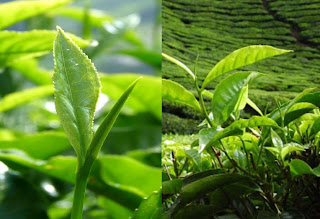Green tea has been used in China for over
4,000 years as a daily drink at meals and also to cure a variety of conditions
such as headaches, stomach trouble, heart palpitations and depression.
There is an old saying in China:
“Better to be deprived of food for three days, than tea for one”. It was
considered essential that a person have their green tea on a daily basis
Green tea is rich in catechin
polyphenols, particularly epigallocatechin gallate (EGCG). EGCG is a powerful
anti-oxidant: besides inhibiting the growth of cancer cells, it kills cancer
cells without harming healthy tissue. It has also been effective in lowering
LDL cholesterol levels, and inhibiting the
abnormal formation of blood clots.
The latter takes on added importance when you consider that thrombosis (the
formation of abnormal blood clots) is the leading cause of heart attacks and
stroke.
French have a lower occurrence of
heart disease than Americans. The answer was found to lie in red wine, which
contains resveratrol, a polyphenol that limits the negative effects of smoking
and a fatty diet. In a 1997 study, researchers from the University of Kansas
determined that EGCG is twice as powerful as resveratrol, which may explain why
the rate of heart disease among Japanese men is quite low, even though
approximately seventy-five percent are smokers.
Why don't other Chinese teas have
similar health-giving properties? Green, oolong, and black teas all come from
the leaves of the Camellia sinensis plant. What sets green tea apart is the way
it is processed. Green tea leaves are steamed, which prevents the EGCG compound
from being oxidized. By contrast, black and oolong tea leaves are made from
fermented leaves, which results in the EGCG being converted into other
compounds that are not nearly as effective in preventing and fighting various
diseases.
New evidence is emerging that
green tea can even help dieters. In November, 1999, the American Journal of
Clinical Nutrition published the results of a study at the University of Geneva
in Switzerland.
Researchers found that men who were given a combination of caffeine and green
tea extract burned more calories than those given only caffeine or a placebo.
Green tea can even help prevent
tooth decay! Just as its bacteria-destroying abilities can help prevent food
poisoning, it can also kill the bacteria that cause dental plaque. Meanwhile,
skin preparations containing green tea - from deodorants to creams - are
starting to appear on the market.
To sum up, here are just a few
medical conditions in which drinking green tea is reputed to be helpful:
- Cancer: It can reduce the risk of esophageal cancer, but it is also widely thought to kill cancer cells in general without damaging the healthy tissue around them.
- Alzheimer’s and Parkinson’s. It is said to delay the deterioration caused by Alzheimer’s and Parkinson’s. Studies carried out on mice showed that green tea protected brain cells from dying and restored damaged brain cells.
- High cholesterol levels: Green tea reduces bad cholesterol in the blood and improves the ratio of good cholesterol to bad cholesterol.
- Cardiovascular disease: Scientists think, green tea works on the lining of blood vessels, helping keep them stay relaxed and better able to withstand changes in blood pressure. It may also protect against the formation of clots, which are the primary cause of heart attacks.
- Infection: Tea catechins are strong antibacterial and antiviral agents which make them effective for treating everything from influenza to cancer. In some studies green tea has been shown to inhibit the spread of many diseases.
- Impaired immune function: As a good anti-oxidant and having antibacterial and antiviral properties, it boosts immune system naturally.
- Skincare. Green tea can apparently also help with wrinkles and the signs of aging; this is because of their antioxidant and anti-inflammatory activities. Both animal and human studies have demonstrated that green tea applied topically can reduce sun damage.
- Blood Pressure. Regular consumption of green tea is thought to reduce the risk of high blood pressure.
- Depression. Theanine is an amino acid naturally found in tea leaves. It is this substance that is thought to provide a relaxing and tranquilizing effect and be a great benefit to tea drinkers.
To date, the only negative side effect
reported from drinking green tea is insomnia due to the fact that it contains
caffeine. However, green tea contains less caffeine than coffee: there are
approximately thirty to sixty mg. of caffeine in six - eight ounces of tea,
compared to over one-hundred mg. in eight ounces of coffee. One can drink from
two cups of tea to maximum five if you don’t have any sleeping problems.
You can find me on Google+
You can find me on Google+





I love green tea - in addition to the anti-oxidants it is very calming
ReplyDelete